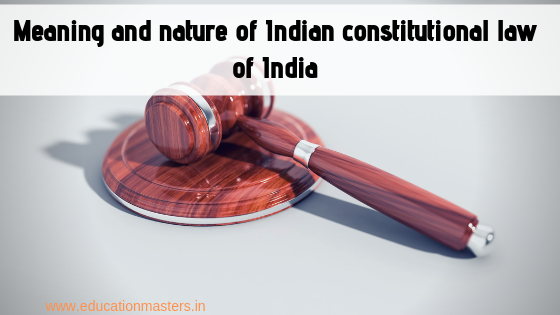Meaning and nature of Indian constitutional law of India
By Aditya pandey | General knowledge | Sep 28, 2019

In this article, we are explaining the overview of the Indian Constitution. This topic comes in all types of law exams if you are preparing for any type of law exams you should study these facts about the Indian Constitution. Indian constitution is the longest constitution of the world. To gain knowledge about the Indian Constitution you can refer this article to know more.
The nature of Indian constitution is unique in that sense it is comprehensive in topics, elaborate in treatment thereof. Balancing and adjusting provision to manage with the new conditions and challenges. And incorporates a board of advisories to solve the constitutional problems found in the constitutional law of other countries.
India is a Union of States. It is a Sovereign Socialist Secular Democratic and Republic with a parliamentary system of government. The Republic is represented regarding the Constitution of India which was received by the Constituent Assembly on 26th November 1949 and came into power on 26th January 1950. The Constitution provides for a Parliamentary form of government which is federal with certain unitary features. The protected leader of the Executive of the Union is the President.
Longest constitution of the world:- The Indian constitution is the longest constitution of the world. This is because of the following reasons:-
The sovereignty of the -
The preamble of the constitution declares that the people of India have adopted and given to themselves this Constitution in the exercise of their sovereign rights. make it clear that the real power is in the hands of the people of India both in the union and the states. The vesting of sovereignty in the landmarks the culmination of the struggle for independence and constitutes, the cornerstone of the constitutional progress
The democratic form of government:-
The constitution of India constitutes inside into a sovereign, socialist , secular, democratic republic it thus provides for the establishment of a democratic form of government . in the nation equity, freedom, fairness and crew whi9ch are fundamental attributes of a majority rules system are announced in the preface as the very destinations of the constitution in a vote based system the administration gets all its power from the desire of the individuals .
Parliamentary form of government:-
The Indian constitution establishes a parliamentary form of government of India both at the centre and the states as distinguished from the presidential form of the government in America. The essential characteristics of parliamentary form of the government are the following
Fundamental Rights:-
The constitution of India contains a long list of fundamental rights of citizens. These rights are necessary for the development of an individual personality .the legislature and executive can not take away these Rights .if the legislature passes a law taking away or abridging fundamental rights, such law may be declared unconstitutional by the courts .these rights are however not absolutely rights.
Directive principle of state policy:-
The directives principle of the state policy contained in part iv of the constitution set out the aim and objectives to be followed by the state in the governance of the country. Although they are not justifiable in the courts of the law, yet5 they are very fundamental and in the governance of the country. No government can ignore them. the idea of the welfare state can be achieved only by implementing the various directive principle contained in the constitution
The mixture of rigidity and flexibility:-
A rigid constitution is one which requires a special procedure for amendment of its provisions while in a flexible constitution, the provision of the constitution can be amended by a ordinary legislative process. A composed constitution is by and large said to be unbending .the Indian constitution, however, composed is adequately adaptable. Most of the arrangements can be changed by the conventional administrative procedure
Fundamental duties:-
Chapter IV-A added by the 42nd amendment for the first time provides for the certain fundamental duties of citizens.These obligations are planned to serve a consistent suggestion to each native that while the Indian constitution explicitly presented on them certain major rights, it additionally expects them to watch certain essential obligations as the standards of the law based direct and vote based practices.
An independent judiciary:-
An independent and impartial judiciary is essential for the success of any democratic system the Indian constitution provides for the establishment of an independent judiciary so that the various rights guaranteed to the citizens of the country can be protected from the arbitrary and unlawful legislative and executive interference.
A secular state:-
In Indian constitution, no religion has been recognised as the state religion. It treats all religions equally. But this freedom is also subject to reasonable restrictions. Anti-national activities can not be permitted in the name of religion.
Single citizenship:-
According to the federal principle, the constitution of the U.S.A. provides for dual citizenship, the citizenship of the USA and citizenship of the state. though the Indian constitution has adopted the federal principle of the American constitution but it had adopted for single citizenship, that is the citizenship of India. there is no state citizenship.
Meaning and nature of Indian constitutional law of India
The nature of Indian constitution is unique in that sense it is comprehensive in topics, elaborate in treatment thereof. Balancing and adjusting provision to manage with the new conditions and challenges. And incorporates a board of advisories to solve the constitutional problems found in the constitutional law of other countries.
India is a Union of States. It is a Sovereign Socialist Secular Democratic and Republic with a parliamentary system of government. The Republic is represented regarding the Constitution of India which was received by the Constituent Assembly on 26th November 1949 and came into power on 26th January 1950. The Constitution provides for a Parliamentary form of government which is federal with certain unitary features. The protected leader of the Executive of the Union is the President.
Longest constitution of the world:- The Indian constitution is the longest constitution of the world. This is because of the following reasons:-
- It has borrowed from all other constitutions their best features. Thus, it had adopted fundamental from the American constitution, the directive principle of state policy from the Irish constitution, parliamentary form of the government and cabinet system from the British constitution it is the because of this that the bulk of the Indian constitution has increased considerably.
- The Indian constitution sets out the structure of the focal government as well as of the states. the American constitution, then again, leaves the states to draw up their own constitution
- The Indian constitution contains a long list of fundamental rights for its citizens and also a number of directive principles. The 42nd amendment has added a new chapter dealing with fundamental duties of the citizens.
- It has to incorporate many provisions which were necessary because of its peculiar problem ex. Size, population and religion etc. it, therefore, contains provisions for schedules caste minorities the backwards classes. anglo Indians, elections commission and various others which are not made parts of the main constitution on of other countries
The sovereignty of the -
The preamble of the constitution declares that the people of India have adopted and given to themselves this Constitution in the exercise of their sovereign rights. make it clear that the real power is in the hands of the people of India both in the union and the states. The vesting of sovereignty in the landmarks the culmination of the struggle for independence and constitutes, the cornerstone of the constitutional progress
The democratic form of government:-
The constitution of India constitutes inside into a sovereign, socialist , secular, democratic republic it thus provides for the establishment of a democratic form of government . in the nation equity, freedom, fairness and crew whi9ch are fundamental attributes of a majority rules system are announced in the preface as the very destinations of the constitution in a vote based system the administration gets all its power from the desire of the individuals .
Parliamentary form of government:-
The Indian constitution establishes a parliamentary form of government of India both at the centre and the states as distinguished from the presidential form of the government in America. The essential characteristics of parliamentary form of the government are the following
- President is the nominal and constitutional head but the real executive power is vested in the council of a minister whose head is the prime minister
- The council of the minister is collectively responsible to the lok sabha
- The members of the council minister are the elected member of t5he legislative directly by the people.
Fundamental Rights:-
The constitution of India contains a long list of fundamental rights of citizens. These rights are necessary for the development of an individual personality .the legislature and executive can not take away these Rights .if the legislature passes a law taking away or abridging fundamental rights, such law may be declared unconstitutional by the courts .these rights are however not absolutely rights.
Directive principle of state policy:-
The directives principle of the state policy contained in part iv of the constitution set out the aim and objectives to be followed by the state in the governance of the country. Although they are not justifiable in the courts of the law, yet5 they are very fundamental and in the governance of the country. No government can ignore them. the idea of the welfare state can be achieved only by implementing the various directive principle contained in the constitution
The mixture of rigidity and flexibility:-
A rigid constitution is one which requires a special procedure for amendment of its provisions while in a flexible constitution, the provision of the constitution can be amended by a ordinary legislative process. A composed constitution is by and large said to be unbending .the Indian constitution, however, composed is adequately adaptable. Most of the arrangements can be changed by the conventional administrative procedure
Fundamental duties:-
Chapter IV-A added by the 42nd amendment for the first time provides for the certain fundamental duties of citizens.These obligations are planned to serve a consistent suggestion to each native that while the Indian constitution explicitly presented on them certain major rights, it additionally expects them to watch certain essential obligations as the standards of the law based direct and vote based practices.
An independent judiciary:-
An independent and impartial judiciary is essential for the success of any democratic system the Indian constitution provides for the establishment of an independent judiciary so that the various rights guaranteed to the citizens of the country can be protected from the arbitrary and unlawful legislative and executive interference.
A secular state:-
In Indian constitution, no religion has been recognised as the state religion. It treats all religions equally. But this freedom is also subject to reasonable restrictions. Anti-national activities can not be permitted in the name of religion.
Single citizenship:-
According to the federal principle, the constitution of the U.S.A. provides for dual citizenship, the citizenship of the USA and citizenship of the state. though the Indian constitution has adopted the federal principle of the American constitution but it had adopted for single citizenship, that is the citizenship of India. there is no state citizenship.
सरकारी नौकरियों, जीके अपडेट्स और करेंट अफेयर्स की ताज़ा जानकारी सबसे पहले पाने के लिए:
-
हमारे WhatsApp चैनल को फॉलो करें:
https://whatsapp.com/channel/0029Vb6sjZz0wajwDXcd5B0U -
हमारे Telegram चैनल को फॉलो करें:
https://t.me/educationmastersin -
हमारे Facebook Page को फॉलो करें:
https://www.facebook.com/educationmastersindia
Share this Post
(इस पोस्ट को अपने दोस्तों के साथ शेयर करना ना भूले)Posts in Other Categories
Latest Posts
Top 10 Longest Rivers in the World | Length, Ori ...
Feb 05, 2026
JEE Main 2026 Session 1 Answer Key Out @ jeemain ...
Feb 04, 2026






.jpg)
.jpg)

